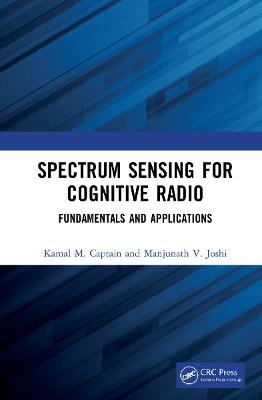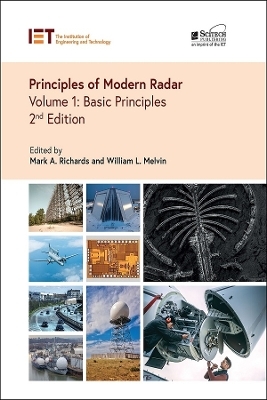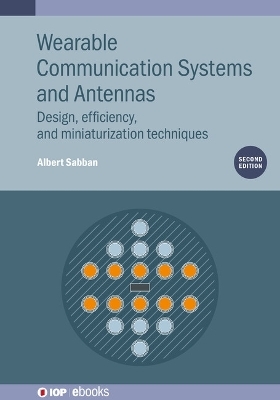
Spectrum Sensing for Cognitive Radio
CRC Press (Verlag)
978-0-367-54293-1 (ISBN)
This comprehensive reference text discusses concepts of cognitive radio and the advances in the field of spectrum sensing.
This text discusses the concept of cognitive radio for next generation wireless communication and a very critical aspect of cognitive radio – that is, spectrum sensing – in detail. It covers important topics including narrowband spectrum sensing, wideband spectrum sensing, cooperative spectrum sensing, system and channel models, detection algorithms, approximation of decision statistics, and theoretical analysis of detection algorithms in detail. Separate chapters are dedicated to discussing the analysis and use of detection algorithms for narrowband spectrum sensing, wideband spectrum sensing, and cooperative wideband spectrum sensing.
Aimed at graduate students and academic researchers in the fields of electrical engineering and electronics and communication engineering, this text:
Discusses concepts of cognitive radio and research in spectrum sensing.
Presents mathematical analysis of algorithms considering practical environment.
Explains novel wideband spectrum sensing algorithms with detailed analysis.
Provides mathematical derivations to help readers.
Discusses basic spectrum sensing algorithms, from narrowband spectrum sensing to the more advanced wideband spectrum sensing.
KAMAL M. CAPTAIN: Dr. Kamal M. Captain received his Ph.D. in the area of Spectrum Sensing for Cognitive Radio from Dhirubhai Ambani Institute of Information and Communication Technology (DAIICT), Gandhinagar, India. Before this, he completed his M.Tech in Communication Systems from Sardar Vallabhbhai National Institute of Technology (SVNIT) and B.E degree in Electronics and Communication Engineering from Veer Narmad South Gujarat University (VNSGU), Surat, Gujarat, India. He is currently serving as an assistant professor at Sardar Vallabhbhai National Institute of Technology (SVNIT), Surat, Gujarat, India. Prior to joining SVNIT, he served as a senior engineer (signal processing) at eInfochips, Ahmedabad, India. He has been involved in active research in the areas of cognitive radio, wireless communication, signal processing, and machine learning and has several journals and international conference papers, including IEEE Transactions. He has also served as a reviewer for IEEE Transactions, letters, and top tier conferences. MANJUNATH V. JOSHI: Prof. Manjunath V. Joshi received the B.E. degree from the University of Mysore, Mysore, India, and the M.Tech. and Ph.D. degrees from the Indian Institute of Technology Bombay (IIT Bombay), Mumbai, India. He is currently serving as a Professor and and Dean Research and Development with the Dhirubhai Ambani Institute of Information and Communication Technology, Gandhinagar, India. He has been involved in active research in the areas of Signal and Image Processing, Cognitive Radio, Computer Vision, and Machine Learning and has several publications in quality journals and conferences. He has co-authored four books entitled Motion-Free Super Resolution (Springer, New York-2005), Digital Heritage Reconstruction using Super-resolution and Inpainting (Morgan and Claypool-2016), Regularization in Hyperspectral Unmixing (SPIE Press-2016), and the book entitled Multi-resolution Image Fusion in Remote Sensing (Cambridge University Press, UK-2019). Currently, he is contributing as a co-author of a book to be published by Springer in remote sensing, where seven positive reviews have been received. So far, nine Ph.D. students have been graduated under his supervision. Dr. Joshi was a recipient of the Outstanding Researcher Award in Engineering Section by IIT Bombay in 2005 and the Dr. Vikram Sarabhai Award for 2006-2007 of information technology constituted by the Government of Gujarat, India. He served as a Program Co-Chair for the 3rd ACCVWorkshop on E-Heritage, 2014, held in Singapore. He has also served as Visiting Professor at IIT Gandhinagar and IIIT Vadodara. He has visited Germany, Italy, France, Hong Kong, the USA, Canada, South Korea, Indonesia and contributed to research in his area of expertise.
1. Fundamentals of Probability Theory. 2. Introduction. 3. Literature Review. 4. Energy Detection based Spectrum Sensing Over Generalized Fading Model. 5. Generalized Energy Detector in the Presence of Noise Uncertainty
and Fading. 6. Diversity for Wideband Spectrum Sensing Under Fading. 7. Cooperative Wideband Spectrum Sensing. 8. Conclusions and Future Research Directions. 9. Appendix A Appendix for Chapter 1. 10. Appendix B Appendix for Chapter 4. 11. Appendix C Appendix for Chapter 5. 12. Appendix D Appendix for Chapter 6. 13. Appendix E Some Special Functions. 14. References.
| Erscheinungsdatum | 04.01.2022 |
|---|---|
| Zusatzinfo | 25 Tables, black and white; 78 Line drawings, black and white; 78 Illustrations, black and white |
| Verlagsort | London |
| Sprache | englisch |
| Maße | 156 x 234 mm |
| Gewicht | 489 g |
| Themenwelt | Technik ► Nachrichtentechnik |
| ISBN-10 | 0-367-54293-5 / 0367542935 |
| ISBN-13 | 978-0-367-54293-1 / 9780367542931 |
| Zustand | Neuware |
| Haben Sie eine Frage zum Produkt? |
aus dem Bereich


